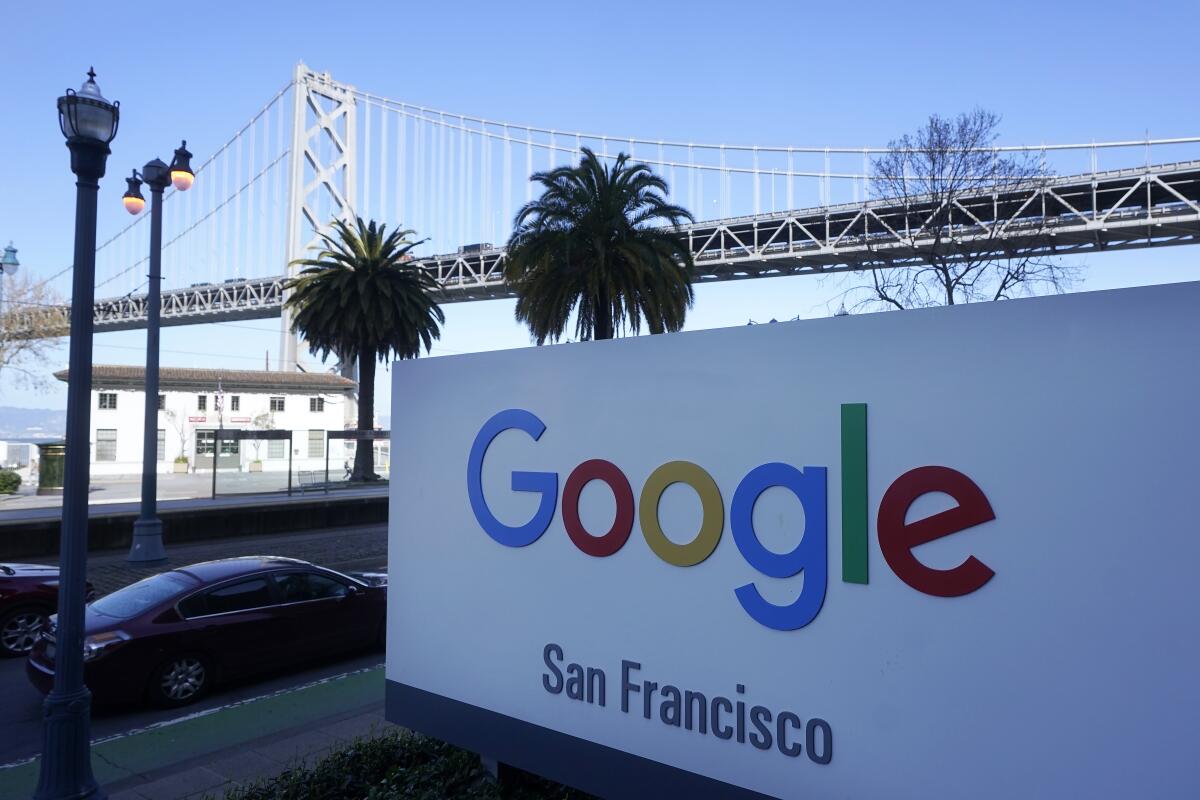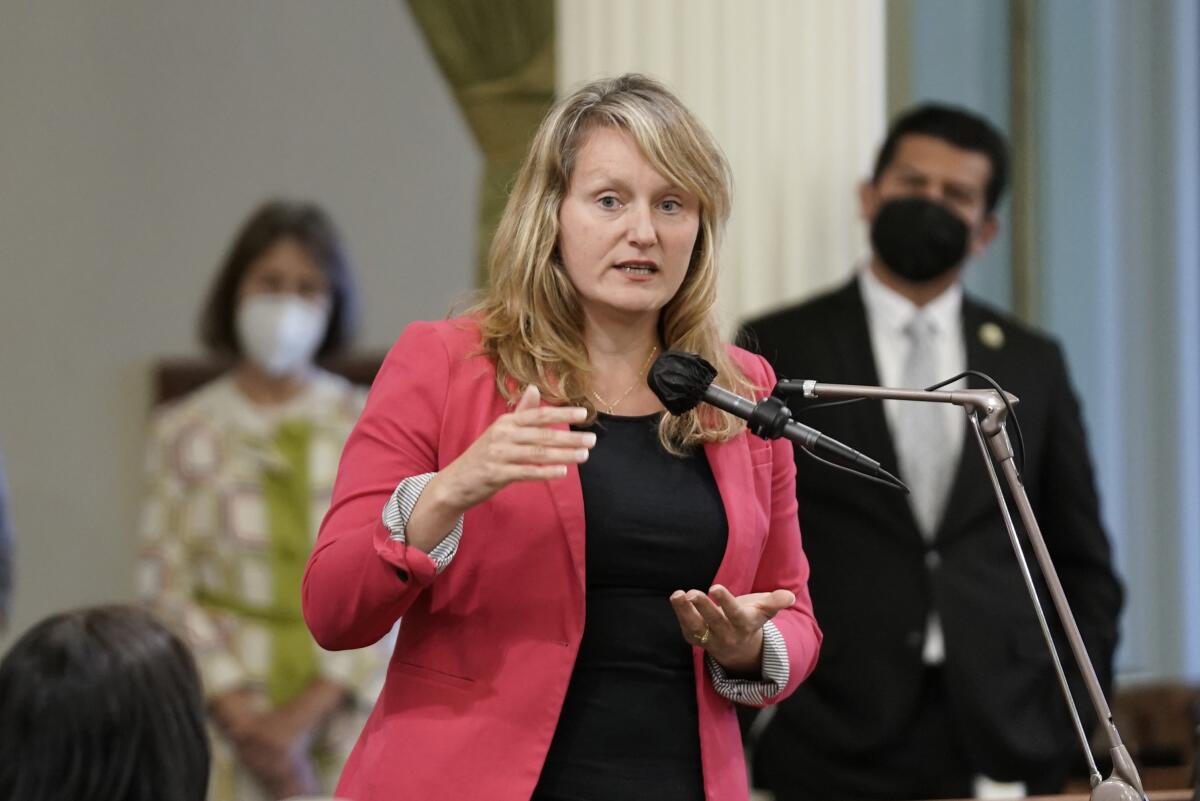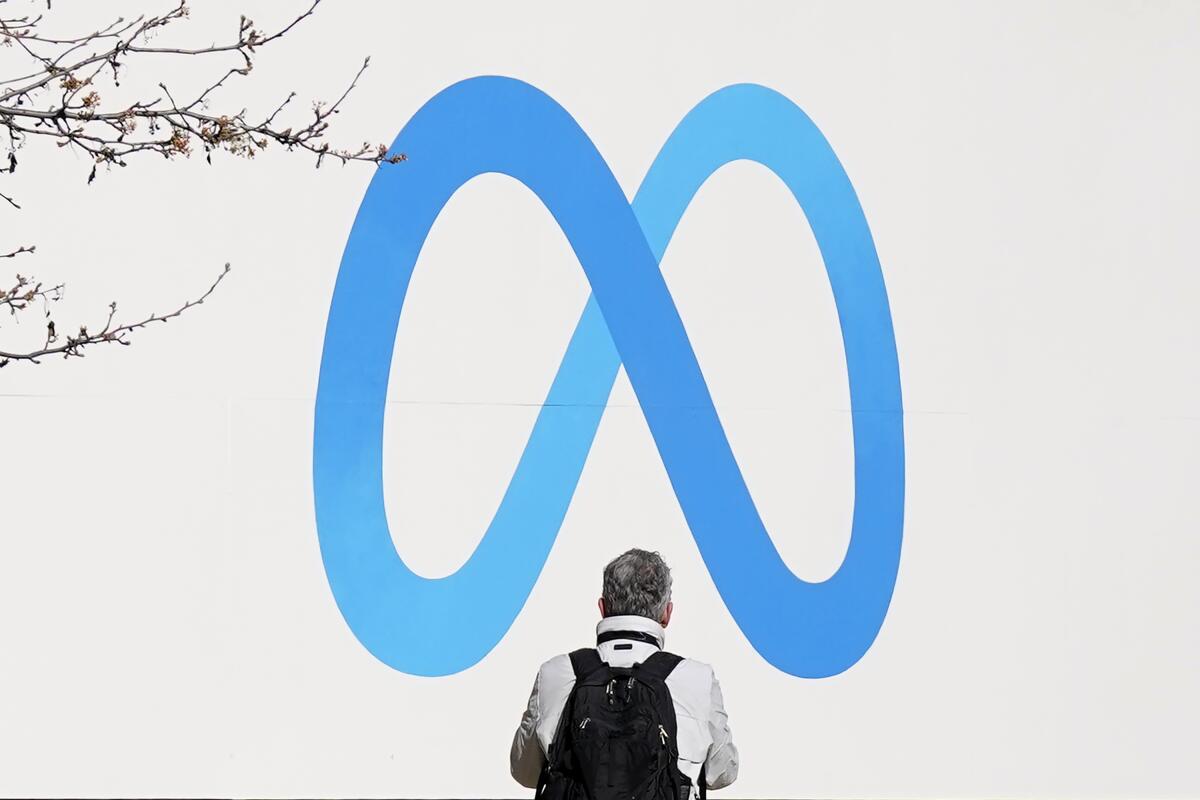Early this summer, California seemed poised to play a leading role in shaping a new frontier of tech regulation as lawmakers considered bills to force big digital platforms to pay local news.
The legislation, which would have been a first in the United States, advanced in Sacramento as newspapers struggle with precipitous decline and Google battles in federal court over claims that it violated antitrust laws by illegally maintaining a monopoly on web searches.
But over a few weeks in August the push for legislation fell apart.
Google lobbied hard against the California Journalism Preservation Act, which would compensate news outlets for articles that show up in search results. Division among news outlets was rife as some smaller publishers feared it would disproportionately benefit big legacy publications. And Gov. Gavin Newsom had made no public commitment to signing a bill.
California Gov. Gavin Newsom, shown this month, may require companies to spend the journalism funding on new hires, a position many publishers probably will resist.
(Matt Slocum / Associated Press)
Now, weeks after Assemblymember Buffy Wicks (D-Oakland) dropped the legislation in favor of a nonbinding agreement between Google and the state, numerous questions remain unanswered about how it will work.
A bare-bones framework of an agreement, sketched out on a single sheet of paper, the deal promises $125 million for a journalism fund that will be parceled out to local newsrooms over five years.
But nothing stops Google from walking away from its commitment to $55 million. State funding of $70 million depends on approval from legislators and Newsom, and the governor may require companies to spend the money on new hires, a position many publishers probably will resist. UC Berkeley is supposed to administer the fund, but its leaders want more assurance from the state that the fund will transform local news — and a stake in how it is run.
Meanwhile, publishers are pushing for more journalistic oversight of an additional part of the deal — Google’s $62-million payment for a new but ill-defined “AI accelerator” — arguing that it could result in job losses if tech controls the board.
Some journalists and publishers say the deal is better than nothing. But many are disappointed that California — a state that prides itself on passing innovative, progressive laws — ultimately bailed on taking on Big Tech.

Google lobbied against the California Journalism Preservation Act, which would have required it to compensate news outlets for articles that show up in search results.
(Jeff Chiu / Associated Press)
A few said they miscalculated the challenge of fighting digital giants — particularly in a state where tech corporations hold significant sway in government and have contributed millions of dollars to the governor’s causes. Google’s ties with Newsom go back some 20 years to his days as San Francisco mayor, when he made headlines for flying from Switzerland with Google’s founders in a chartered jet.
“It was very hard to pass this legislation in Google’s backyard,” said Julie Makinen, chair of the California News Publishers Assn., the bill’s lead sponsor. “We grossly underestimated the political complexity of that in a state where Google is the homegrown wonder child that has a lot of influence and is very close to the governor.”
Robert Salladay, Newsom’s senior advisor of communications, pushed back, saying the governor had worked to strike a balance between imposing regulations and encouraging innovation.
“This is a compromise,” Salladay said. “The governor is part of and approved a deal that will benefit the California news industry by a quarter of a billion dollars. No other state has done anything close to that. How does that mean he’s kowtowing to Google?”
How the deal came together
Over the last two decades, Silicon Valley has developed wildly successful search and social media sites that have fundamentally disrupted the financial model of journalism. As the new platforms gobbled up digital advertising, the state has lost about two-thirds of its newspaper journalists.
The problem isn’t confined to California. After Australia and Canada crafted deals to get tech to pay news outlets, Wicks looked to Canada as a model for her legislation.
Wicks knew it was going to be tough to take on Big Tech on its home turf. But she said she was caught by surprise by two other factors: Google’s preexisting agreements to pay certain publishers, and divisions her proposal stoked within the journalism industry.

California Assemblymember Buffy Wicks (D-Oakland), said: “My goal was to get resources into the hands of publications as quickly as we could, because publications are literally dying right now.”
(Rich Pedroncelli / Associated Press)
Wicks joined forces with state Sen. Steve Glazer (D-Orinda) on a separate bill that would impose a data-mining fee on tech companies, forcing them to pay $500 million a year. In June, both bills advanced in the Capitol.
Around the same time, Wicks spotted red flags in Canada. A year after the government there forced Google to pay $74 million a year, publishers had yet to receive the money. Some complained they were no better off, or in a worse position, after Google canceled preexisting financial deals and Meta stopped distributing news on Facebook and Instagram.
Wicks soon came to see both California bills as precarious — unlikely to reach Newsom’s desk or be signed into law. Even if Newsom signed, the bill would face years of litigation at a time when many publishers faced dwindling funds and imminent layoffs. So she began negotiating with Google.
“My goal was to get resources into the hands of publications as quickly as we could, because publications are literally dying right now,” Wicks said.
According to interviews with 20 legislators, Capitol staffers, publishers, lobbyists, union leaders, journalism experts and trade group leaders — some of whom spoke on the condition of anonymity to protect their relationships — there was bitter disagreement on the path forward. Google declined to speak on the record.
Newsom was silent in April when Google protested AB 886 by removing links to California news sites — a sharp contrast to Canadian Prime Minister Justin Trudeau, who had slammed Google for “bullying tactics” in his country.
The governor wondered why the state should force Big Tech to bail out some of the state’s biggest news owners.
As Wicks moved to negotiate a deal, she said she hoped California could secure an amount on par with the $74 million a year Google agreed to pay Canada, a country with a similar population and smaller economy.
Wicks called on former Sen. Bob Hertzberg, a onetime California Assembly speaker known for forging landmark deals on school bonds and access to Colorado River water, to lead discussions with Google and Newsom’s office.
An intense negotiator, Hertzberg called and Zoomed with newspaper lobbyists and media executives, who explained the dire state of their industry and said they needed money soon to avert layoffs.
He met with a team of Google lobbyists and executives who insisted that the state pitch in, along with other Big Tech companies. Google pushed back on the idea that it should pay as much in California as Canada, Hertzberg said. It said a fair figure would consider that it is already paying $10 million a year to local California outletseven though it terminated that spending in Canada. Plus, Canada’s deal includes payments to national outlets, but California’s bill focused solely on local news.

(Eric Baradat / Getty Images)
National outlets such as the New York Times and the Wall Street Journal have a large chunk of readers in California, and Google already is compensating them. Last year, Google agreed to pay $100 million over three years to the New York Times, whose second-biggest market is California.
In her bill, Wicks said local news sustains civic society and provides a far deeper level of California reporting than national outlets. But Hertzberg did not dwell on such concerns.
“What became clear from our many hours of discussions is that the vast majority of news read by Californians online is from national newspapers, and not local California publishers,” Hertzberg said. “The various platforms can have their own relationships with those publishers — our focus was on isolating support for local California publishers, which we did.”
A role for AI?
With the bill dead, fierce divisions emerged over the amount of money Google would pay, the makeup of the board that would administer funds and the lack of journalistic oversight over the AI portion.
The California News Publishers Assn. pushed back against the idea of Google paying $62 million into an “AI accelerator” program managed by a nonprofit “under terms to be defined by founders.” A separate $5 million would go to an AI fund for journalism.
Makinen, former editor in chief of the San Francisco Standard, urged Wicks to increase the journalism portion of the AI fund to 50% and make sure it was administered by an independent entity.
Makinen believes AI could be a powerful tool to help reporters sort through meeting recordings or identify misinformation. But she said Big Tech was way ahead and publishers urgently needed AI tools to compete.
“The time to reset this is now,” Makinen wrote to Wicks, “while the ink on this document is not yet dry and the story of how AI killed journalism is not set in stone.”
But the draft framework did not change.
Alicia Ramirez, publisher of the Riverside Record, a tiny nonprofit digital newsroom that covers Riverside County, was shocked to read that the state would pay $70 million into the journalism fund. A heck of a lot of taxpayer money, she thought, for something supposed to hold big tech accountable.

In Canada, a year after the government there forced Google to pay $74 million a year, publishers had yet to receive the money. Google canceled preexisting financial deals and Meta stopped distributing news on Facebook and Instagram.
(Jeff Chiu / Associated Press)
Ramirez was irked that Local Independent Online News Publishers, a trade association that partnered with Google to create Startups Lab, was asking small publishers to write to Wicks’ office to support the deal.
Ramirez did write to Wicks’ office — to register her opposition.
“This is simply not enough,” she wrote. “I urge you to go back to the drawing board.”
Glazer, who had worked with Wicks to advance legislation, came out against the deal: “a 2% solution,” he said, “is not going to pull independent news out of their death spiral.”
Rebuild Local News, a nonprofit coalition, estimates the total settlement — including the amounts paid by the state — would result in about $5,000 to 8,000 a year per California journalist, compared with about $30,000 in Canada.
Restoring the state’s news industry, the group calculates, would cost $125 million a year — about 0.625% of Google, Meta, and Amazon’s combined $20 billion in ad revenues last year in California.
The fights ahead
When the deal was finally announced Aug. 21, Newsom hailed it as “a major breakthrough in ensuring the survival of newsrooms” — one that would “support hundreds of new journalists.”
Yet nothing in the framework requires hiring new journalists. If that becomes a requirement, it’s not clear how newsroom managers facing massive deficits would retain existing journalists. “The Governor would prefer the money go toward rebuilding the industry,” Salladay said, “not maintaining the status quo.”
Another uncertainty surrounds UC Berkeley’s role.
Geeta Anand, the dean of UC Berkeley’s graduate journalism school until she went on leave earlier this month, said UC wanted assurance that the state will continue funding the school’s California Local News Fellowship and give it seats on the journalism fund’s board.
Ultimately, she said UC leaders would take part only if they felt assured that the fund would have a significant effect on California journalism.
“The journalism school would really like to help support a state effort to transform local news,” Anand said. “So much more is needed…. This is truly just a start.”
Wicks said she supports state funding for UC Berkeley’s news fellowship and is open to extending an opportunity for the university to join the fund’s governing board. She also said she intends to tighten the parameters of the “AI accelerator” fund to ensure it would “help build tools to help and to augment, not to replicate or replace.”
Some remain dubious.
“There’s nothing in this deal that’s a deal,” said Matt Pearce, president of the Media Guild of the West and a former L.A. Times reporter, noting Google set the terms. “It’s all built on a handshake — a handshake with a monopoly.”
The fight over Big Tech’s role in the decline of local news will continue next year in Sacramento: After Newsom presents his budget in January, advocates will pack hearings again as legislators grapple over state funding.
Beyond California, the battle will shift to Illinois and other states and a broader federal move to regulate Big Tech.
“This is the beginning,” Wicks said. “Not the end.”





